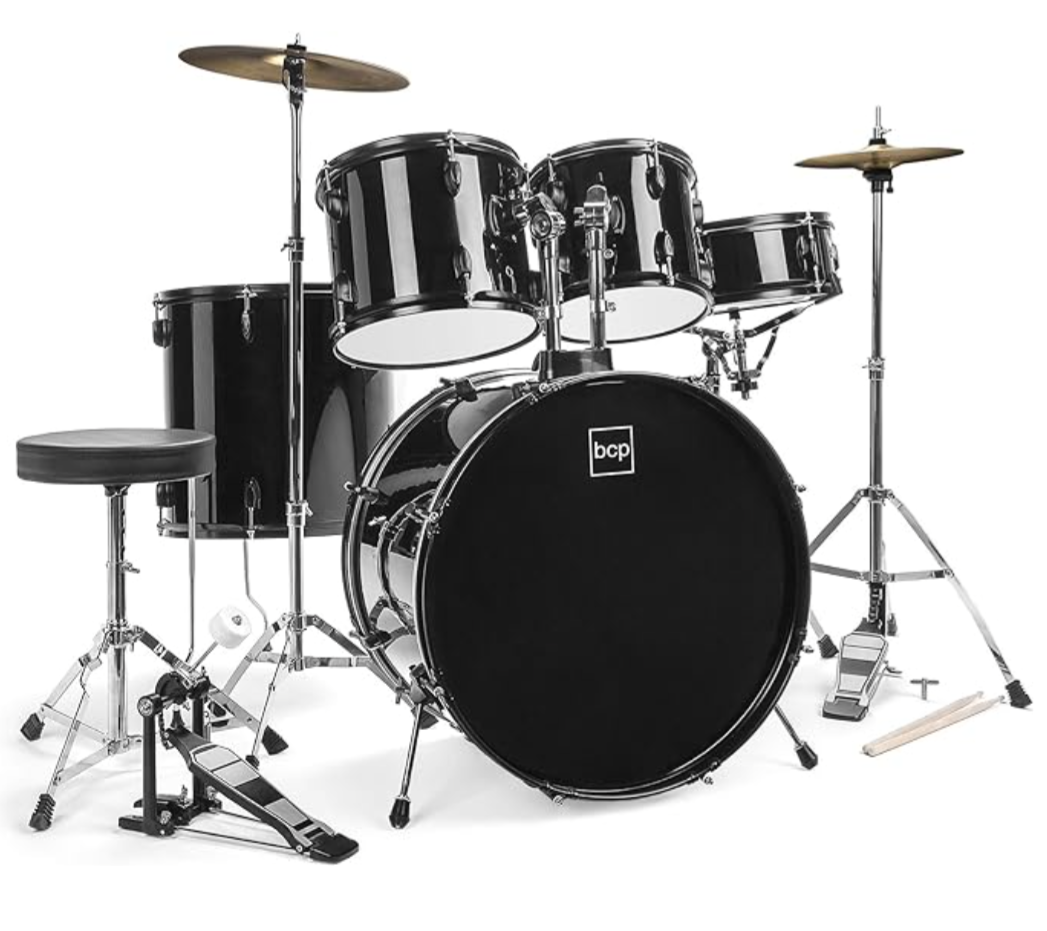
Dreaming of becoming the heartbeat of a band? Whether you’re an aspiring drummer, a band enthusiast, or a music hobbyist, the journey to becoming a professional drummer in a band is exhilarating and challenging. In this comprehensive guide, we’ll walk you through the steps on how to become a drummer in a band, share tips on how to get better at drumming, and provide insights into the best drum sets available on Amazon. Let’s dive in and start your rhythmic journey to success.
1. Follow Your Passion: The First Beat of Your Drumming Journey
The road to becoming a drummer in a band begins with a deep passion for music and rhythm. Your enthusiasm will be the driving force that keeps you motivated, even when the journey gets tough. Remember, every professional drummer started as a beginner with a dream.
Embrace Your Love for Music
- Listen Actively: Immerse yourself in various genres of music. Pay attention to the drum patterns, rhythms, and styles used by different drummers.
- Attend Live Performances: Watching live performances can be incredibly inspiring. Observe the drummers and their techniques, and learn from their energy and stage presence.
- Connect with Other Musicians: Join local music communities, online forums, and social media groups to connect with fellow musicians. Sharing experiences and exchanging knowledge will fuel your passion and growth.
2. Invest in Quality Equipment: The Foundation of Your Sound
To become a good drummer, you need to invest in quality equipment that enhances your playing experience. A reliable drum set is essential for developing your skills and achieving the sound you desire. Here are a few tips to help you choose the perfect drum set:
Consider Your Budget and Needs
- Set a Budget: Determine how much you can afford to spend on a drum set. Take into account not only the initial cost but also any additional expenses, such as cymbals, hardware, and accessories.
- Understand Your Needs: Think about what kind of music you want to play and your playing style. This will help you decide on the size, material, and features of the drum set that best suits your needs.
Explore Different Brands
- Research Brands: Do thorough research on different brands to find out their reputation for quality and customer service. Read reviews from other drummers and check out their social media pages to get a better understanding of their products.
- Try Before You Buy: If possible, visit a music store and try out different drum sets. This will give you a feel for the drums and help you make an informed decision.
Invest in Necessary Accessories
Apart from the drum set itself, there are essential accessories that every drummer needs:
- Sticks: Drumsticks come in various sizes, materials, and tip shapes. Experiment with different options to find what feels comfortable for you.
- Cymbals: Cymbals produce the high-pitched sounds in your drumming. It’s important to have a good variety of cymbals to create different tones and textures in your playing.
- Hardware: Hardware refers to stands,
Starting with Acoustic Drums
One highly recommended acoustic drum set for beginners and intermediate drummers is the Pearl Export EXX 8-Piece Double Bass Drum Set with Hardware – Burgundy. This set is known for its durability, excellent sound quality, and versatility, making it a fantastic choice for aspiring drummers.
Exploring Electronic Drums
For those who prefer electronic drums, the Pearl Electronic Drum Set (EM5422HBR)offers a great blend of technology and playability. With its advanced features and realistic feel, this set is perfect for practicing quietly at home or recording music with precision.
3. Master the Basics: Building a Strong Foundation
Before you can dazzle audiences with complex rhythms and solos, it’s crucial to master the fundamentals of drumming. Focus on building a strong foundation that will support your growth as a drummer.
Learn Proper Technique
- Grip and Posture: Ensure that you hold the drumsticks correctly and maintain proper posture while playing. This will prevent injuries and improve your control.
- Basic Rudiments: Practice basic drumming rudiments like single strokes, double strokes, and paradiddles. These patterns are the building blocks of more complex rhythms.
- Timing and Tempo: Use a metronome to practice playing in time. Developing a solid sense of timing is essential for any drummer.
Develop Your Skills
- Consistency: Regular practice is key to improvement. Set aside dedicated time each day to work on your drumming skills.
- Variety: Experiment with different styles and genres to expand your musical vocabulary. This will make you a versatile drummer capable of adapting to various band settings.
- Feedback: Record yourself playing and analyze your performance. Seek feedback from experienced drummers and instructors to identify areas for improvement.
4. Join a Band: Finding Your Musical Family
Becoming a drummer in a band is not just about playing the drums; it’s about finding your musical family and creating something special together. Here are some tips on how to get started.
Networking and Opportunities
- Local Music Scene: Attend local gigs, open mic nights, and music festivals to meet other musicians and bands. Networking is crucial for finding potential bandmates.
- Online Platforms: Use websites like BandMix, Join-A-Band, and social media platforms to connect with musicians looking for drummers.
- Music Schools and Workshops: Enroll in music schools, workshops, and drum clinics to improve your skills and meet like-minded individuals.
Auditions and Collaboration
- Be Prepared: When auditioning for a band, practice the band’s songs thoroughly and showcase your versatility.
- Communication: Effective communication is vital in a band setting. Listen to your bandmates, share ideas, and be open to constructive criticism.
- Commitment: Joining a band requires dedication and commitment. Be prepared to invest time and effort into rehearsals, recordings, and performances.
5. Never Stop Learning: The Path to Mastery
Becoming a professional drummer is a lifelong journey of continuous learning and improvement. Stay curious and open to new experiences, and you’ll continue to grow as a musician.
Advanced Techniques and Styles
- Drum Lessons: Consider taking lessons from experienced drummers to learn advanced techniques and expand your skill set.
- Workshops and Masterclasses: Attend workshops and masterclasses conducted by renowned drummers. These events provide valuable insights and inspiration.
- Music Theory: Understanding music theory will enhance your ability to communicate with other musicians and create more intricate drumming patterns.
Recording and Performing
- Recording Skills: Learn the basics of recording and producing music. This will help you create high-quality demos and collaborate with other artists remotely.
- Live Performances: Embrace every opportunity to perform live. Each performance will build your confidence and stage presence.
Staying Motivated
- Set Goals: Define short-term and long-term goals for your drumming journey. Celebrate your achievements and stay focused on your aspirations.
- Join a Community: Being part of a drumming community can provide support, motivation, and opportunities for growth. Share your progress and learn from others.
Conclusion: Embrace Your Drumming Dream
Becoming a drummer in a band is a rewarding pursuit that combines passion, dedication, and creativity. By following these steps and staying committed to your dream, you’ll be well on your way to becoming a professional drummer.
Ready to take your drumming journey to the next level? Subscribe to our email list for more tips, insights, and updates on all things music. Let’s keep the rhythm going together!






